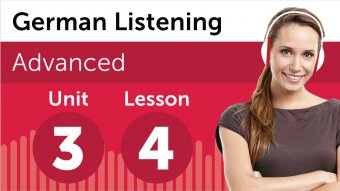Hi Andrew,
Thank you for getting back to us and sorry
that German is so complicated. 😄
You are right of course in that English is a lot easier at times and I personally
think that that's the very reason for why it was chosen the international language.
As to your question about Wohlfahrt, there is an easier explanation I think:
I noticed that the fifth paragraph contains the expression "wohltätige Zwecke", for which
the English version uses "welfare", and the German word for welfare is Wohlfahrt.
The English translation for "wohltätige Zwecke" is "charitable purposes", by the way. 😉
If you have any further questions, please don’t hesitate to contact us again.
Kind regards,
Reinhard
Team GermanPod101.com



Comments
HideDid you get it right?
Hi Andrew,
Thank you for your follow-up too! 😉
That quote of Goethe's, wow, it's so true, isn't it? 👍
And yes, Japanese is something else.
Kind regards,
Reinhard
Team GermanPod101.com
No need to apologize Reinhard! And thank you for the follow-up.
This is the fun and challenge of learning a foreign language. I agree with Goethe's observation 'Wer fremde Sprachen nicht kennt, weiss nichts von seiner eigenen'. While German is somewhat more complicated than English, there are, I am sure, many way more complicated languages out there. I'm trying to learn a few words of Japanese and it is daunting: 3 different alphabets (that can be used in the same sentence?!), and 3 different ways of conjugating verbs depending on the level of formality. The simplest way of writing "no" looks like it requires 5 letters.
Hi Andrew,
Thank you for getting back to us and sorry
that German is so complicated. 😄
You are right of course in that English is a lot easier at times and I personally
think that that's the very reason for why it was chosen the international language.
As to your question about Wohlfahrt, there is an easier explanation I think:
I noticed that the fifth paragraph contains the expression "wohltätige Zwecke", for which
the English version uses "welfare", and the German word for welfare is Wohlfahrt.
The English translation for "wohltätige Zwecke" is "charitable purposes", by the way. 😉
If you have any further questions, please don’t hesitate to contact us again.
Kind regards,
Reinhard
Team GermanPod101.com
One of the challenges in learning German as an English speaker is how often the sentences are longer and more complex to communicate the same info. eg.
„Ein Student und eine Studentin unterhalten sich über ehrenamtliche Tätigkeiten.‟ = "A male and female student talk about volunteering."
As an aside, I note that die Wholfahrt (no plural) is in the vocabulary, but not the lesson itself. Presumably another case where the text was updated at some point.
Hallo robert groulx,
You are very welcome. 😇
Feel free to contact us if you have any questions.
Good luck with your language studies.
Mit freundlichen Grüßen,
Levente
Team GermanPod101.com
thanks for the lesson
my favorite word is Gnadenbrot
i did get it
robert